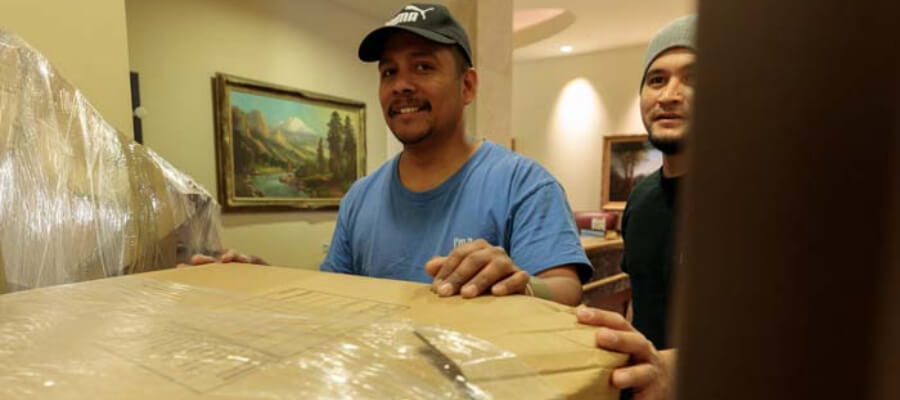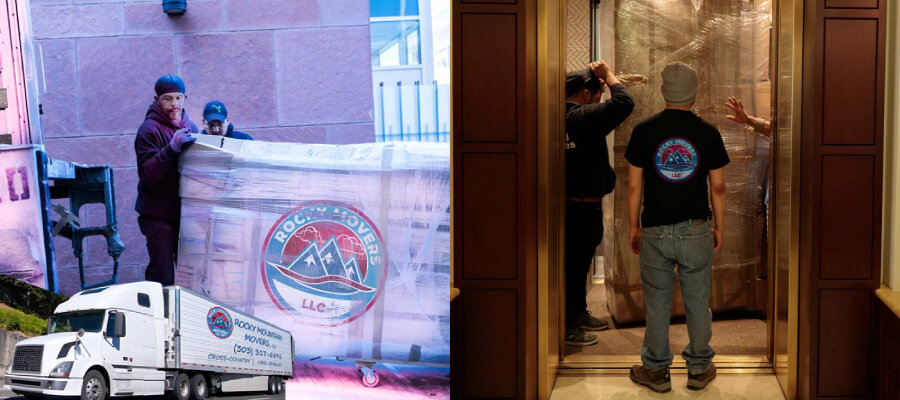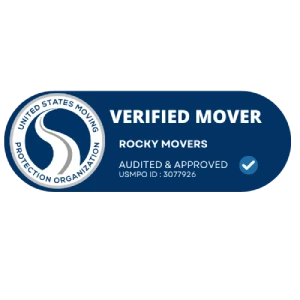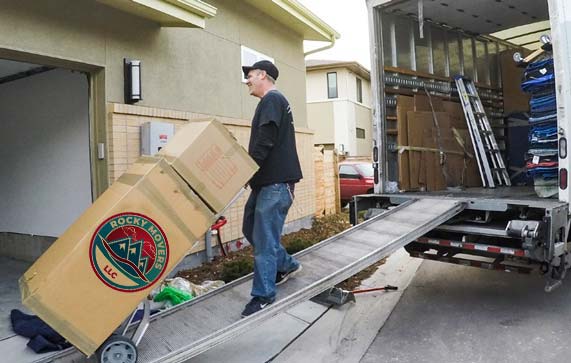Understanding Moving Insurance
Our household and the belongings within our homes make the space what it is. Many items are of extraordinary value, others are sentimental, and some are timeless and irreplaceable when making a long-distance or cross-country move.
Most Denver residents will begin the process by consulting with their homeowners or renters insurance policy agent to understand how they provide coverage and what kind of protection they will receive for their household goods.
Purchasing moving insurance can feel confusing because there are different types of moving insurance to choose from; you need to understand your mover’s liability coverage, released value protection, full value protection, etc.
Outside forces cannot adequately evaluate the value of your belongings following the personal opinions and emotions you have around them. Hence, you must understand the types of moving insurance options available – whether with your current homeowner’s insurance policy, coverage offered by a third-party provider, or through long-distance moving companies.

 The Role of Federal Law in Moving Insurance
The Role of Federal Law in Moving Insurance
You may wonder how the government, the Department of Transportation, and federally appointed agencies can impact and create legislation surrounding moving insurance. As far as federal law has regulated – there are two major types of insurance full value protection and released value protection. You should receive a pamphlet or electronic copy of ‘Your Rights and Responsibilities When You Move,’ which reviews all the federally regulated guidelines around moving and trip transit insurance.
 The Basics of Moving Insurance Coverage
The Basics of Moving Insurance Coverage
Under the options available as basic coverage through your full-service long-distance movers, you must consider that each state also has its governing bodies around moving and moving insurance. Your homeowner’s insurance policies may look differently in Denver than if you were moving to California.
Insurance companies offer clients the ability to save money, but they are there to sell insurance at the end of the day. If you are not working directly with your cross-country movers, contact your homeowners or renters insurance cover moving. If neither works – you are looking at a third-party insurance company.
The problem is, aside from the moving process, even the most basic coverage can feel confusing, and when your homeowner’s insurance policy doesn’t provide the value coverage you were hoping for or only provides limited coverage – you are stuck reaching out to a moving insurance company you have no information on to protect and secure your personal belongings.
Cross-country moving companies will always offer extra moving insurance when your homeowners and renters insurance policies don’t unveil the easiest option. Still, there are a whole lot of moving pieces that can affect how that will work for you.
Hiring movers is meant to defend your belongings in transit, but there are always unknown aspects of the moving and claims process that can affect how your coverage helps in the process of lost or damaged goods.

Exploring Full Value Protection
When booking movers of state moves, you immediately want to assume you are working with a reputable moving company you can rely on throughout the moving process. Unfortunately, even with the most reliable relocation experts, accidents can still happen, and not everything that happens on the road is in the moving company’s control.
How much coverage you purchase depends on how much liability is presumed under state insurance laws. The full value protection level of insurance is an excellent option for coverage if you prefer to deal with everything in-house, with your movers. Every cross-country moving company in America is there to provide full value protection insurance coverage options, but they should provide customers the flexibility of separate liability coverage.
This is considered the most comprehensive coverage offered by moving companies as it is much better than the released value coverage and sits on a more level playing field per the current market value of your belongings. Full value protection is carried from the estimate and throughout the transportation of your goods unless you opt for a different option for your moving coverage. Full Value protection coverage covers any household goods transported by your interstate movers.

 The Benefits of Full Value Protection
The Benefits of Full Value Protection
While this is the most reasonable type of coverage to opt for if you relocate with national moving companies, it is valued at $6.00 per pound per article. If you have a shipment of 6,000 pounds and the entire load magically disappears, lost, or damaged, you would be entitled to $36,000.00.
In the instance of full value protection coverage, or full replacement value protection, your movers can differentiate on some details of the moving insurance.
With any high-value items, they will set aside a form for you to further specify what those items are. They should allow you to purchase moving insurance through third-party insurance companies to protect those valuable items further.
If you are a household looking for the best cross-country movers in Denver, you are moving with your family to a new place. You are willing to spend a little bit more money to protect your items, full value protection coverage will provide you ample protection for your belongings, and the claims procedure is a simple solution to any lost or damaged belongings that could incur during transit.

 Full Replacement Value: What It Means for You
Full Replacement Value: What It Means for You
If you opt for full-value protection, you cannot expect a cash settlement for your high-value items or full market value for your household goods. Most moving companies should offer separate liability coverage to fill the coverage gap, but it doesn’t wholly bridge things.
While the full replacement value protection is undoubtedly better than basic coverage for moving insurance, it doesn’t mean there aren’t additional options you should consider.
If you opt-in for full value protection moving insurance, you also agree to a full packing service completed by your moving crew. You can’t expect the moving company to cover household goods they didn’t wrap and pack themselves, as they are responsible for securing those belongings because if something was to go wrong, your movers will:
- Repair or restore the items to the original condition they departed your pick-up location.
- Replace the things that were lost or damaged.
- Pay for a replacement.
This is why your movers will thoroughly inventory all items and their condition when utilizing the full-value protection option. You can check out any moving blog on your mover’s website for further information regarding their coverage options.
While the value of your belongings can’t always be so easily determined, coverage from the moving companies isn’t guaranteed if the movers didn’t pack your items, in the event of natural disasters, or if the damage happens in storage and the storage location is not associated with your movers.

The Basics of Released Value Protection
The local consumer affairs agency is an organization that oversees all forms of moving insurance, helps to regulate guidelines, and can provide additional information on how to research further your moving coverage options, relocation insurance group options, and how to save money when purchasing third-party insurance.
If you have already Googled ‘long-distance movers near me‘ and are locating the right moving company for you, consider asking them about their released value protection. Moving insurance coverage is required by law for any organization to travel interstate with household goods, and the released value protection option is the mover’s liability.
 Understanding the 60 Cents Per Pound Basic Coverage
Understanding the 60 Cents Per Pound Basic Coverage
Are you moving to Seattle with your one-bedroom apartment in tote, or are you moving to Arizona with many extraordinary value items? While it doesn’t matter where you are going, full replacement value is always a good option if traveling with a large household with many expensive belongings.
If you are single and want to opt for liability coverage to keep the moving insurance cost down – released value protection may be the right option.
While basic coverage can be frowned upon, it doesn’t mean it is lousy coverage – homeowners insurance policies may be unable to provide coverage during a cross-country or long-distance relocation project. So, what does released value protection moving insurance cover?
You are looking at a whopping 60 cents per pound per article – meaning if your bookshelf was damaged while you were moving to Montana and it weighed a total of 20 pounds, you would be reimbursed $12.00 for that shelf once working with your moving company to complete all the necessary claims procedures. 60 cents per pound is the most basic coverage required by law for all interstate moving companies.
 When to Choose Released Value Protection
When to Choose Released Value Protection
Released value protection isn’t the worst insurance coverage option if you aren’t looking for third-party coverage and do not want to splurge on full-value protection options provided by your relocation specialists. Choosing to move using a rental truck company without moving insurance is the one route you should always avoid.
This kind of moving insurance may be entirely void if you choose to complete the packing yourself, your items are placed in storage, or you are at risk of natural disasters – just as if you opt for full-value protection. While released value protection may not be the right option for everyone, if you are just moving to Florida for college and don’t have a ton of items of extraordinary value or you are hoping to save money while still meeting your basic relocation needs – release value protection still covers more than no insurance at all.

The Costs Associated with Moving Insurance
Even with bare minimum coverage options – you are still looking at relying on some sort of insurance provider, whether that be your long-distance moving company’s liability, homeowners insurance policies, or your third-party insurance – there are always issues locating exclusion-free coverage that comes at a free cost.
If you hope to replace your belongings for their current market value, you must put forward some money. It is possible for moving insurance to be used to supplement transit valuation and provide coverage of the market value of your household goods!
 Estimating Your Moving Insurance Cost
Estimating Your Moving Insurance Cost
Estimating the cost of moving insurance depends mainly on the type of insurance you choose. The cost of moving insurance is very different than auto insurance coverage.
- Suppose you are going with your homeowners insurance policy. In that case, you can simply continue with your current coverage. Alternatively, you may further discuss how to upgrade your insurance policy to cover transit, storage, and relocation with your insurance provider.
- The cost of moving insurance for full value protection will be approximately 1% of the final cost of your moving expenses.
- If you choose third-party insurance or a separate liability policy as your type of coverage, you can be sure you are looking at about 5% of the valuation estimate.
- Released value protection and any other form of basic moving coverage will be included with the cost of your move. They should typically be free with the service, but not if you go the DIY route with a rental company.
 Factors That Influence Insurance Cost
Factors That Influence Insurance Cost
There are many different moving pieces to moving insurance; whether you are choosing to go directly through your moving company or third-party insurance, you can not expect your moving coverage or any set type of coverage to completely set you up for a complete cash settlement for any damages or loss that may occur. There are a few things that could affect your total cost of moving insurance:
- Items of extraordinary value, if you have high-value items, there will inevitably be a higher replacement value which can change the type of coverage you may be interested in. It can also mean you may want to look outwards toward another insurance policy for additional coverage.
- Storage is where you may see a coverage gap because you may need storage when your belongings are already in transit, which means if something is to go wrong during that time or you are being stored with another company, your belongings aren’t covered. You may want to add additional protection to ensure your items are still insured.
- Packing, in instances of released value protection and full value protection – requires moving companies to complete the packing on your behalf; otherwise, your belongings won’t have coverage. This will increase the total cost of your move but is associated directly with what your moving insurance cover.

The Role of Renters and Homeowners Insurance in Moving
You may wonder, doesn’t my renters or homeowners policy cover my belongings? Unfortunately, not every plan will offer coverage during a cross-country move. While moving companies do their best to ensure they can offer you options for insurance, they cannot always provide options for third-party insurance as they do not sell insurance; they are professional movers.
Sometimes renters and homeowners coverage can offer similar circumstances to what you see in released value protection with moving companies; other times, there is nothing unless you change your coverage entirely. The events around what they can and cannot assist with lie with your current policy, so it is always best to contact your representative directly for more information.
 How Renters Insurance Can Complement Moving Insurance
How Renters Insurance Can Complement Moving Insurance
You should always opt for moving insurance with your moving company if you choose not to go with a third-party insurance organization for assistance. Still, the good thing about having renters or homeowners on your side is the additional boost it can provide for your relocation!
There are limitations to moving insurance through moving companies, as previously discussed. While they can feel frustrating, there are things within the policy that you can speak with your renters or homeowners agent about.
When your goods are traveling across the country, moving insurance may only cover damage to your belongings if it occurs at the pick-up or delivery location; this doesn’t necessarily cover things if…
- High-value individual items.
- The storage facility, in the event of a fire or natural disaster.
- In transit, if the truck carrying your belongings gets into an accident or is stolen.
The Limitations of Homeowners Insurance Policies
While there are upsides to what your homeowners or renters insurance policy can offer during a long-distance relocation, there are also limitations.
You will want to make the most informed decision about your coverage, especially regarding your household belongings. If you don’t understand what your current coverage offers, it is vital that you ask questions.
- What kind of circumstances of lost or damaged items will be covered?
- What kind of damage is or isn’t covered?
- Is there a deductible I must pay if I undergo a total or partial loss?
- What kind of moving insurance is best to purchase on my policy?
Supplemental Liability Coverage: An Extra Layer of Protection
While moving insurance isn’t always the most simple idea, your moving company should be able to walk you through the basics. Other matters regarding your goods traveling across the country, such as trip transit insurance and supplemental liability coverage, can be pressing. Supplemental liability coverage is often associated with truck rentals rather than a moving company, but either way – this type of coverage may be right for you.
Supplemental coverage is often offered through a third-party insurance agency to supplement any kind of insurance coverage your contract is with. So, suppose you are moving to Massachusetts but have decided to rent your truck and haul your belongings across the country.
In that case, you may purchase supplemental insurance on top of what your truck rental company requires or offers. The same goes if you are moving to Connecticut with a full-service, licensed moving company and choose to pay for full value protection. You may also want to seek out supplemental insurance options for high-value items of extraordinary value.
 The Benefits of Supplemental Liability Coverage
The Benefits of Supplemental Liability Coverage
There is no downside to purchasing third-party insurance because you are proactive about providing ample protection to your household goods. You will always have the peace of mind to know you have that extra safety net for unique or expensive items you do not want to see lost, damaged, or destroyed.
There are many benefits of third-party moving insurance and trip transit insurance to fill the coverage gaps. It can offer you that basic coverage moving companies provide cannot…
- Natural disasters that resolve with damaged or complete loss.
- Mechanical and any kind of electrical issue resulting in damage or loss.
- Water damage, mold, or mildew.
- High-value items.
- Belongings in storage.
- Pairs or sets of objects.
 Working with a Third Party Insurance Company
Working with a Third Party Insurance Company
Consulting with third-party insurance companies is quite a different experience than working directly with your moving company. While moving companies should always provide additional options for you to supplement for high-value items or anything particularly special to your household, working with a third-party company means you will deal directly with them throughout the booking and claims procedures, if applicable.
These companies sell moving insurance; therefore, they can advise you on the best insurance policy for you quickly; they should also be able to provide options for you to insure individual items so you can customize your policy! You will need to do some footwork to locate these companies, as most moving companies cannot advise you on specific third-party options.
Once you have located some options, be sure to do your research and ask questions throughout the process. Understanding your insurance policy and the coverage offered is the most crucial aspect of booking supplemental insurance options.

Choosing the Right Moving Companies for Your Move
Moving insurance can feel like a maze; navigating your coverage options through each avenue is essential to ensuring the safety of your household goods. However, the most critical component of protecting your belongings is choosing the right moving company for your long-distance move.
There is no question that this can be a process as well, and it is important to ask for referrals, get multiple quotes and do some research before booking. Being a responsible consumer in 2023 means verifying your moving company before a contract bonds you.
A moving company only has a genuine purpose if they can help people with their relocation needs, so never forget, these moving companies work directly for you. When you are searching for a moving company, there are a few things you may want to do…
- Do your research and ask around for referrals. If your neighbor has recently moved locally, ask them if the company they worked with can assist in long-distance matters. Complete research online, read reviews, and be sure to ask questions upon your initial consultation.
- Get multiple estimates; you don’t have to sign the first quote you receive immediately. Try getting at least three estimates to compare and contrast each against your moving budget and relocation needs.
- Make sure you are working with a licensed and insured moving company! You can review information about your potential moving companies through the FMCSA or DOT websites. This should verify their licensing information to travel interstate, verify insurance and ensure no outstanding complaints against them.
- You don’t want to end up in a situation with a broker company – they typically disguise themselves as licensed movers. Still, they do not require insurance as they will only connect you with a full-service moving company to complete your relocation.
- Look at their experience level; you want to work with a company with a solid background in packing, storage, moving, and transit services. Fully vetting their experience through the Better Business Bureau, reviews, further research, and asking questions during the booking process.
 The Importance of Choosing Insured Moving Companies
The Importance of Choosing Insured Moving Companies
Working with a licensed, legitimate, and insured moving company is the most pivotal aspect of ensuring you have a successful long-distance move. You don’t want to put all your faith in moving companies that do not have the liability to protect your belongings because if they do not assume any responsibility, even with the most basic coverage required, why would they prioritize defending your items?
They are not held to the same standards as reputable and legitimate movers without the correct licensing and insurance. A moving company without the proper licensing cannot be considered a moving company! You will not receive quality moving services, and they will not be held accountable if anything happens.
Questions to Ask Your Moving Company About Insurance
Before signing on any dotted line, you will want to ask your movers a few questions…
- What is the price of moving insurance?
- Does your moving company offer both full replacement value and released value protection?
- Are belongings insured in your storage facility?
- Are my household goods insured during transit?
- How can I file a claim?
- Who should I notify if my items are lost or damaged?
- What should I do to insure my high-value items?

The Role of Homeowners Insurance in Moving
Homeowners insurance is something every homeowner needs to protect their home from accidents, fires, floods, repairs, etc. Without that insurance policy, if something was to go wrong and your home is broken into, or there is a fire that starts in the condition – you are footing the bill. The same goes for moving insurance; your homeowner’s insurance may be able to assist you in the process.
It is best to use it in conjunction with the moving insurance offered through your moving company. Still, without having a backup policy to rely on if something goes wrong, your moving company will only assume liability for the coverage you sign for.
 How Homeowners Insurance Can Help During a Move
How Homeowners Insurance Can Help During a Move
When you move, you will likely turn directly to your homeowner’s insurance policy to confirm whether or not it covers your belongings during the relocation process. If a loss is to occur, it must be listed within your policy, but only in certain situations.
They should typically cover things if there is an accident while your belongings are in transit. There is also coverage for your belongings so long as they were protected correctly with packing before loading up for their travels.
 The Limitations of Homeowners Insurance
The Limitations of Homeowners Insurance
Your current homeowner’s policy may not cover damages or losses incurred during a cross-country move. The jargon listed in your current policy is what makes all the difference. Your homeowner’s insurance should usually cover things leaving, traveling, and arriving at your new home, but that is not always the case – it depends on when and how those items were damaged.
Most policies hinge everything on the type of covered peril, which means how the loss occurred. You must speak thoroughly with your personal agent before moving day. This way, you will understand what moving insurance you should opt for!

People also ask
 How much does moving insurance cost?
How much does moving insurance cost?
Insurance costs will change depending on how you choose to move, who you are choosing to move with, and the coverage you go with. You must continually evaluate your options because accidents can still occur even with the best cross-country moving companies.
Suppose you are working with your moving company and decide on the basic coverage option of released value protection. In that case, you will not be charged for anything as they assume that liability, and you can claim any damage or loss with their set insurance company at sixty cents per pound per article.
If you are hoping for more protection and choose full-value protection, you can expect to pay anywhere from 1 to 4% of the total cost of your move. However, if you are going the third-party route, you can purchase a negotiated policy depending on your need; this can be customized to insure individual items. Third-party insurance typically costs approximated $1.25 per pound.
 What are the types of moving insurance?
What are the types of moving insurance?
- Released value protection – basic coverage offered through your moving company at no charge to clients. It covers $0.60 per pound, not offering full market value on belongings.
- Full value protection – comes at an additional cost to your moving package. It protects your inventory so long as your movers pack everything, but it will not cover high-value items or belongings over $100 per pound.
- Third-party insurance – provides coverage on your full inventory, partial inventory, or individual items. This will cover the events of accidents, storage, and natural disasters. Coverage will come at an additional cost negotiated between the client and third party, but it will also cover high-value items exceeding $100 per pound. This is a great option to supplement released value protection.
- Homeowners’ & renters’ insurance – covers belongings depending on how the damage occurs. This is great in conjunction with released or full-value protection, and you should consult with your current agent on your policy before moving.
 What types of insurance do you need when you move out?
What types of insurance do you need when you move out?
You will want to ensure that your renters or homeowners insurance policy is still up to date before the moving day comes. This ensures you are protected if there is any damage to your property.
You must also confirm with your movers whether you will opt for released value or full value protection to ensure your belongings are protected. You may also want to look into supplemental insurance options if you have high-value items.
 Does homeowners insurance cover items in transit?
Does homeowners insurance cover items in transit?
Your homeowner’s insurance may cover items during transit, but it would depend on how damage or loss occurred if it was too. Before loading everything in your home onto a moving truck, you must discuss this with your insurance agent.
 Does Lemonade cover damage during moving?
Does Lemonade cover damage during moving?
Lemonade does not assume responsibility when your belongings are in the hand of any kind of third party. Your items would not be covered during loading, transit, storage, or unloading. They put the responsibility on the third party, the moving company, if your household goods are damaged, lost, or misplaced.

Wrapping Up: The Crucial Role of Insurance in Out-of-State Moves
Before you head out into the next chapter of your life, knowing all the ins and outs of your insurance policy and coverage options is crucial. Some of the very best long-distance moving companies can fight through the claims process.
They may put clients where they wish they had taken those extra steps to secure basic coverage through a third-party insurance company. Understanding and evaluating your options is essential to ensuring a successful relocation and defending your household goods.
Rocky Movers is a local, licensed, bonded, and insured full-service moving company – placing the protection of every client’s belongings and transit safety at the forefront of their priorities. Rocky is dedicated to providing premium interstate moves with the added layer of protection of premium packing, secure storage solutions, and additional insurance options to provide complete and total security for your household goods.
When you are making a long-distance move, having the peace of mind and knowing you are placing all of your belongings into the hands of reliable movers that can back up their reputation with solid insurance options is the only way to do cross-country moving!




